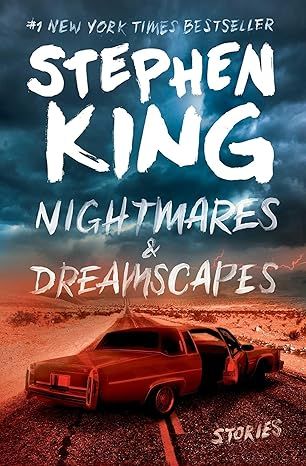Nightmares & Dreamscapes
4.6 out of 5
2,373 global ratings
Includes the story “It Grows on You”—set in the fictional town of Castle Rock, Maine
The classic short story collection from #1 New York Times bestselling author Stephen King.
A wrong turn on a lonely road lands a wayward couple in Rock and Roll Heaven, Oregon, where there’s no escaping the free nightly concert….A novelty toy becomes an unexpected and terrifying instrument of self-defense….An ex-con pieces together a map to unearth a stolen million dollars—but at what price?...A private investigator in Depression-era Los Angeles is finding his life unraveling as he discovers the shocking truth of who he really is….A third-grade teacher is willing to dig deep in order to exact revenge for his murdered wife.... These are just some of the haunting scenarios to be found in this classic collection—spellbinding tales from the darkest places and the unparalleled imagination of fiction’s master storyteller.
Stories include:
- Dolan's Cadillac
- The End of the Whole Mess
- Suffer the Little Children
- The Night Flier
- Popsy
- It Grows on You
- Chattery Teeth
- Dedication
- The Moving Finger
- Sneakers
- You Know They Got a Hell of a Band
- Home Delivery
- Rainy Season
- My Pretty Pony
- Sorry, Right Number
- The Ten O'Clock People
- Crouch End
- The House on Maple Street
- The Fifth Quarter
- The Doctor's Case
- Umney's Last Case
- Head Down
- Brooklyn August
992 pages,
Kindle
Audiobook
Hardcover
Paperback
First published October 30, 2017
ISBN 9781501192036
About the authors
Stephen King
Stephen King is the author of more than fifty books, all of them worldwide bestsellers. His first crime thriller featuring Bill Hodges, MR MERCEDES, won the Edgar Award for best novel and was shortlisted for the CWA Gold Dagger Award. Both MR MERCEDES and END OF WATCH received the Goodreads Choice Award for the Best Mystery and Thriller of 2014 and 2016 respectively.
King co-wrote the bestselling novel Sleeping Beauties with his son Owen King, and many of King's books have been turned into celebrated films and television series including The Shawshank Redemption, Gerald's Game and It.
King was the recipient of America's prestigious 2014 National Medal of Arts and the 2003 National Book Foundation Medal for distinguished contribution to American Letters. In 2007 he also won the Grand Master Award from the Mystery Writers of America. He lives with his wife Tabitha King in Maine.
Read more
Reviews
Amazon Customer
5
Stephen King fan
Reviewed in the United States on April 24, 2024
Verified Purchase
Came brand new. Can’t wait to start reading. Thanks for prompt delivery
Joesmom
5
Excellent Reading
Reviewed in the United States on May 29, 2024
Verified Purchase
As usual Stephen King takes us on a roller coaster ride of great stories. I love his short stories. I can't wait for more.
Doxiemom
5
Big big book
Reviewed in the United States on June 26, 2024
Verified Purchase
Received quickly in good condition. I am a huge Stephen King fan but never really read his short story books. Luckily I have discovered that I love short storie books. so have several to enjoy. Sweet! Make no mistake, this is a BIG, fat book, probably not one to take on a plane trip… haha, but I love big books and this should keep me happy for a while for sure!
Read more
kbeag
5
Great book!
Reviewed in the United States on March 3, 2024
Verified Purchase
Stories are engulfing. It came quickly and in perfect condition
Adam Rasmusson
5
Excellent Short stories
Reviewed in the United States on July 25, 2024
Verified Purchase
Thoroughly enjoyed this book. 24 short stories, easy to digest before bed or on a lunch break. It arrived on time and in excellent condition. Was not expecting a 1st edition in such great condition. Perfect addition for the collection.
Sharon Miller
5
Stephen King book
Reviewed in the United States on August 31, 2024
Verified Purchase
Have as a gift. They had requested it. Arrived intact and perfect condition. They have not read it yet but were excited to get it .
Tim Valeri
5
Nice
Reviewed in the United States on September 19, 2024
Verified Purchase
Nicer
Travis Brashear
4
I Prefer King's Novels to His Short Fiction, But There's Still Some Wonderful Treasures to Be Found...
Reviewed in the United States on October 21, 2013
Verified Purchase
"Dolan's Cadillac" - a nice, lean thriller that pleasantly surprises precisely because it features no surprises. I imagine this story of an average man's anything-but-average quest for vengeance may have seemed underwhelming upon first release but in the modern age's fixation (sparked 14 years ago by M. Night Shyamalan's THE SIXTH SENSE) with every story having a big, context-shattering twist or two, there was something hypnotic about the inexorability of "Dolan's Cadillac"'s main character's quest for cold justice. Once again, King's focus not on action but on character as it defines, and is defined by, the action, is what makes this such a compelling read.
"The End of the Whole Mess" - an interesting read, with a post-apocalyptic sci-fi bent, but there's something about it that I can't quite pinpoint that just seems a little immature. It reads like something that would have come from the mind of a seventeen year old writer, not in the actual command of language, which is every bit was cultivated as one would expect from an author of King's caliber, but in the story's themes, action and vision. I apologize for being vague but it's just that as I continued to read it, I kept thinking to myself, "this is the type of overwrought, earnest story I always wrote before I got to college and learned a little bit more about nuance and `right-sizing' the story!" In other words, not trying to turn brushing your teeth into a novel or, in the case of "The End of the Whole Mess", put the end of the world into a pamphlet. And though King's vision of escalating violence at the beginning of the new century, including a reference to a major bombing in London, was prescient, the central plot conceit of the story--that Waco, TX represented the epicenter of non-violent human behavior--had to have been immensely embarrassing for King considering the infamous Branch Davidian massacre in Waco occurred right after this book was written and a mere handful of months before NIGHTMARES & DREAMSCAPES was released. I guess that is the eternal problem with writing sci-fi; at some point, time marches forward and turns your inspired imagination into so much childish, wrong-headed prattle. Not a bad story by any means, but very dated and rather melodramatic.
"Suffer the Little Children" - a fun, easy and creepy read, the chief virtue of which is its rare ability to make a very unlikeable character a sympathetic one in just a few short pages. Those who beat the drums of originality will moan about the obvious credit the story owes to "Village of the Damned", I won't try to dissuade them, but I will make the case that "Suffer the Little Children" offers a superior, much less corny and quite a bit darker and more chilling take on the older story's tropes (when we find out it's not just the main character being assaulted by the antagonists, it's heartbreaking). And bonus points to King for leaving so much unexplained (including what exactly the antagonists even are); in some contexts, that can feel like lazy writing, but here, it seems purposeful and ratchets up the tension exponentially because we all fear most that which we don't understand.
"The Night Flier" - a truly excellent, King-in-his-prime piece--I friggin' loved it! This is the Stephen King you remember from the `80s, and it's nothing but straight, visceral horror, albeit with a patina of mystery over it, as we join a rather despicable investigative tabloid reporter as some overlooked leads inspire him to follow after what appears to be a burgeoning serial killer, one who travels by Cessna plane and takes his victims only in the small town airports at which he lands. The story sizzles and crackles throughout, with a lot of those funny lines and observations that no one makes better than King, but the final third of the story is, and I'm not trying to be hyperbolic here, pure vintage King, where the Horror-o-Meter is cranked to full. I hear the movie made of "The Night Flier" is garbage; trust me, the original short story is not. In fact, you could even say it "sings like a boid." It's certainly one of my favorites of the entire book.
"Popsy" - Kissing cousins with the preceding "The Night Flier", this one doesn't reach the same unsettling heights, but still has plenty of virtues. Putting the reader in the shoes of a child abductor is a ballsy choice, and puts the audience on edge within a few short lines (King sure seems interested in unpleasant protagonists by this point in this book!). The problem is that, after a truly disturbing beginning, King seems to suddenly get bored with the proceedings and ties everything up in the last couple of pages much too quickly and disinterestedly, which is a shame because there are a lot of layers to this brief piece (chief among them a focus on cold, karmic justice; perhaps a better title would have been "Who Stalks the Stalkers?") that deserved a little more time and attention in order to cultivate them to their full potential. If perfect pacing was the lynchpin of "The Night Flier", unnecessarily accelerated pacing is this story's (not fatal) downfall. King's mentions in NIGHTMARES & DREAMSCAPES's preface that, by this point in his career, it had become progressively harder for him to conjure short stories; you can smell the sweat of that awkward labor here which is entirely missing from "The Night Flier" (though, strangely, that story was published a year after "Popsy"). Having said that, "Popsy" is A TALE OF TWO CITIES next to...
"It Grows On You" - some really brilliant, delicate prose here, and such rich evocation of the setting, you can almost feel the very texture of the air, but all squandered in the service of a greatly deflated non-story. All buildup, with zero payoff, this truly reads like Chapter One of a novel that will never exist, but which would have provided some much-needed context and meaning to this minor piece. And for those eager to just stand foot in Castle Rock one last time, prepare to be greatly disappointed--you'll only spend time on the fringes of town (think the Camber place of CUJO fame), and you'll only encounter one character you've met before (Andy Clutterbuck, whose ultimate fate was already divulged in NEEDFUL THINGS), so you'll learn nothing new about what happened to any number of Castle Rock citizens you care about, including Alan Pangborn or Polly Chalmers. Perhaps more than anything I've ever read by Stephen King, this story can best be summed up with a shrug and a "I didn't get it!"
"Chattery Teeth" - Stephen King is notorious, and without peer, for taking outrageous and outlandish situations and concocting them in such a way that we buy into them utterly and completely. He takes the willing suspension of disbelief to new, incredible heights, but he may have pushed it just a little too far with this one. Don't get me wrong, there's a lot to love in this tale, and it has some really frightful moments involving an unhinged hitchhiker (between this story and the last section of CREEPSHOW 2, it's clear King has some real issues with them), but the problem is, when your story centers around a paranormally animated set of chattery teeth (you know, those disembodied teeth that you wind up and they begin insanely biting away) acting like a savage guard dog, even the most dedicated King fan (present company included) has to throw up his hands and go, "Really, Steve?!". Remember that infamous King-related scene in one FAMILY GUY episode ("You're not even trying anymore, are you?")? It cuts a little too close to the bone of truth here. Tongue is firmly in cheek with this tale, to be sure, but King is too good at balls-to-the-wall horror for him to give it short shrift, so the result is a strange tonal schism throughout the piece where the reader is never really sure whether they should be screaming or laughing. Often you're doing both at the same time. I will say this--King is so good at what he does, he gets away with more in this patently absurd story than anyone should have any rights to.
"Dedication" - Well, if things got a little too silly with "Chattery Teeth", they get a little too real with "Dedication", a story which is not poorly written in any way, but one which I've read twice now (once, years ago in DARK VISIONS and now again, in NIGHTMARES & DREAMSCAPES) and must concede I have no affection for whatsoever. The less said about the details of this story, the better, but suffice it to say it's one of the most, perhaps THE most, uncomfortable reads I've ever had from King, an experience that comes off like overhearing a conversation between two close friends about something so personal, intimate and scandalous that you can't help but feel shameful at having listened in. Despite a promising beginning, about halfway through "Dedication", you begin to say to yourself, "I don't like where this is headed!" but, oh yes, Constant Reader, that's exactly where it's going and there are no detours along the way. This is a repellant story, a truly sickening and nauseating read, but not because of anything grisly, like you might expect, and even be eager for, in a King story, and I would argue the payoff does not justify one's endurance of it (though King's explanation in the "Notes" afterword of his motivations in writing this story do help to put it in a more revealing, justifiable context; as such, it is the one story in the book for which I'd recommend reading his "Notes" before reading the story proper). On another point, the story traffics heavily in voodoo/black magic, which I find to be the most tired and unconvincing of all horror story tropes. Black magic is like the funnel cake of the horror genre: unpleasantly heavy, somehow unclean, and completely without substance or nutritional value, leaving you with a sick, unhealthy feeling afterward. But it isn't powdered sugar King sprinkles all over this bad treat; no, it's an entirely different white substance. Don't say you haven't been warned. I will say this--"Dedication" may be one of my least favorite stories in this collection, but no story here intrigued me as strongly in terms of its backstory, wondering what kind of twisted event inspired King to write it in the first place...thank God for the "Notes" section at the close of the book...
"The Moving Finger" - Not much to say here, but that's no slight. A trim, no-fat, "creepshow" full of absurdist imagery that, if you really take the time to visualize it in detail, is extremely disquieting. There's no moral here, or subtext, save for some minor commentary on those who are so uptight about things everyone has to do that they can't do them while being watched (think "gotta see a man about a horse"), just straight to the lean-and-mean goodies. Horror writing con brio, you might say. I had a lot of fun with this one.
"Sneakers" - a hilariously twisted concept that could only originate from the mind of a male (a haunted public restroom) that is undone at the 11th hour by Stephen King's Achilles heel--a weak ending. Up to that point, it's very much a page turner, all outrageous setup for a flat tire ending that earns none of it. Whether his books and stories are great or disappointing, I very rarely agree with King's harshest critics that he's lazy, but the last couple of pages are exactly that--lazy, "I'm bored of writing this", perfunctory closure. The other 30 pages deserved much better. Just because the story involves toilets doesn't mean King had to take a dump on it.
"You Know They Got a Hell of a Band" - a whimsical idea, "what if rock `n' roll really will never die?" (remember, this was written before pop and hip-hop have tragically all but proven AC/DC's mantra premature), taken to its most horrific extreme. Overall, this is a middling King effort, but I greatly appreciate that King never gets cutesy or too "wink, wink" at his audience with it. There is a slowly tightening feeling of entrapment that becomes quite palpable as the story unfolds but positioning such beloved historical figures as are found herein as nightmarish creatures proves problematic (really, could Roy Orbison ever be scary?). The fact that this book was published only about half a year before the untimely death of Kurt Cobain is perhaps the creepiest thing about it.
"Home Delivery" - a really wonderful little bonbon of horror that appears to represent the final word on Little Tall Island from DOLORES CLAIBORNE and the subsequent STORM OF THE CENTURY (one of my personal favorites from King); if I have any complaint about this story, it's that, after beginning with the wonderful intimacy that marked DOLORES CLAIBORNE and GERALD'S GAME, it broadens out in a jarring, almost zany manner to something of THE STAND or the latter half of DREAMCATCHER proportions before returning to where it works best, alone with one Maddie Pace on a preternaturally quiet, moon lit evening...until her beloved husband returns home...at least what's left of him. There's a tenderness in this piece, a look at global tragedy and terror brought down to the most microcosmic level, that spoke pretty profoundly to me. I think there's a novel's worth of potential here but perhaps letting the story blossom unchecked would have robbed it of the very simple grace I so adored about it.
"Rainy Season" - a trifle, but a fun one, that reminded me a lot of King's earlier story, "Weeds", the basis for the "Lonesome Death of Jordy Verrill" section of the movie CREEPSHOW, in that it takes an idea of such laughable ludicrousness (think the most infamous scene of MAGNOLIA taken to the most extreme level) and runs with it full tilt. A minor effort, the literary equivalent of fast food; tasty, but nothing that will stick with you or provide you anything of lasting value.
"My Pretty Pony" - less a story than a rumination, this is a piece that will probably speak very little to readers under 30, profoundly to those 30-60, and as gospel to those in their twilight years. "My Pretty Pony" concerns itself with the elastic nature of time throughout one's life, and (perhaps because I'm just about the same age King was when he wrote it) echoes a great many cold, private thoughts I've had on the dawning realization that, in King's words, "you don't own time, time owns you." Sure, perhaps there's a bit too much pretension on display here, and maybe King tells the tale in a more cryptic manner than would be desired, but it rings with the clanging chimes of Truth for the man or woman who has reached a certain age, and as such, may be the weightiest, most potent, story in the whole book.
"Sorry, Right Number" - very disappointed in this one. A rare teleplay release by King (to my knowledge, "The General" and STORM OF THE CENTURY are the only others) from TALES FROM THE DARKSIDE, there's a good, if unoriginal, idea at the center of it, but it's thoroughly misconceived. The script squanders critical time with too much filler, and focus in all the wrong places. We're meant to feel tremendous sorrow at its conclusion, but we spend so much time in unimportant events with tertiary characters (most notably, an eleventh hour husband from a remarriage), that the intended sucker punch to the gut is entirely too diluted. Not sure what it is but, with the exception of STORM OF THE CENTURY, something vital in Stephen King's genius seems to always get lost when he writes for the screen.
"The Ten O'Clock People" - there are a few reasons why I'm not terribly impressed with this story. One, other than their alarming appearance, it isn't made clear until well into the tale why the creatures representing its horror element are supposed to be so scary (not to mention how shaky their motives, and the subterfuge they feel necessary to conceal it, are). Two, though I find it very laudable for King to create another important African-American character, like the earlier Dick Halloran and Mike Hanlon, and the subsequent John Coffey, I became progressively more and more uncomfortable with what I perceived to be an element of unconscious, unintentional racism in King's writing. It was really nothing more than King's use of the word "black" to describe "Duke" Rhinemann...not that he uses it as a descriptor at all, mind you, but that he uses it over and over. Using the term "black" once or twice to establish a minority character seems completely reasonable, but after that, it becomes a question of, "Steve, you've already clarified the character's ethinicity and appearance. So why do you feel the need to keep belaboring it? I mean, you haven't referred to the main character as `white' once." I don't for one minute think Stephen King is anywhere in the ballpark of intentionally racist, but sometimes, all white people (myself included) seem to be guilty of a totally unintended mild racism that I think stems from being the automatic beneficiaries of a Caucasian majority society. It made me squirm a bit as it kept showing its face in this story; this isn't the brand of uncomfortable I'm seeking out when I turn to a Stephen King book. But the most critical failing of the story is that it feels like the beginning chapter of a much longer, more fleshed out book. All this story is is elaborate setup for a paltry, incomplete and vague payoff. I truly believe that King began writing this with the intention of it being a novel yet quickly tired of it (which is fair, because I don't see cause here to believe it would have been one of his more inspired or memorable creations), so he quickly stitched a half-hearted quasi-ending on it and called it a day. "The Ten O'Clock People" is not a truly bad story--I don't regret reading it; at least the characters were interesting--but prepare yourself for Stephen King to lose interest right at the moment you think it's about to get really interesting.
"Crouch End" - written in the same vein as the earlier story "You Know They Got a Hell of a Band", once again providing us a married couple who gets lost travelling in an unfamiliar area, once again ending bleakly. If anything, King's writing is even darker here, in this cruel forced plunge of fundamentally good people into deepening darkness and spiraling madness. There is no moral lesson here, no object lesson, just a tale of gross, surreal and cryptic misfortune for a couple of tourists who just want to take in a little scenery. King aficionados will delight in a blink-and-you'll miss it nod to THE DARK TOWER series, and fans of Lovecraft will (contrary to the characters in this story) find themselves on familiar ground. One particularly interesting element to this story is that King, who (other than the occasional Colorado of THE SHINING or Pennsylvania of CHRISTINE) is usually loath to ever leave his own native Maine, takes us in "Crouch End" to the other side of the world--namely, London, England. King's relish at flaunting his command of British accents and phrases threatens to get a little cutesy a couple of times, and I honestly can't see any compelling reason why this story needed to take place in the suburbs of London versus a stateside suburbia, but it is a pleasant change of pace for King to set the action of one of his stories so uncustomarily far outside his own backyard.
"The House on Maple Street" - this one goes wrong for me in the exact same manner as ROSE MADDER, my all-time least favorite King novel; namely, in that it takes a very serious subject matter (spousal abuse; physical in the case of ROSE MADDER, emotional in the case of this short story) and uses it as fodder for an exercise in absurd fantasy of the 1950s sci-fi films variety. The characters are wonderfully realized and the story doesn't overstay its welcome like the full-length novel form of ROSE MADDER, but the complete lack of surprises during its climax combined with the aforementioned unsavory mix of cheeky alien spores with a dark side of ugly human psychology that's all too real makes for a misguided conception.
"The Fifth Quarter" - an undistinguished genre exercise for King, notable only for parting from his usual methodology by emphasizing plot over character. This is a crime thriller, in the vein of the Hard Case line of books King would later contribute to with a duo of more nuanced works (THE COLORADO KID and JOYLAND), that exists for no other purpose than to get a handful of shady, sketchily drawn characters who are hampered by too-on-the-nose dialogue (we're just a few steps from "You'll never catch me alive, copper, nyah-ha-ha-ha!" territory here) into a confined place where King stages an action scene of everyone trying to kill each other over stolen loot, a la RESERVOIR DOGS. There are no layers of subtext here, no deeper meaning, nothing that stays with the reader after the final line. The story plays merely as a one-off stretch of creative muscles not usually exercised in King's horror/supernatural works. Nothing particularly bad here, just no meat that sticks to your bones, either. It just is.
"The Doctor's Case" - another genre exercise, this time in the shoes of Sir Arthur Conan Doyle, as King regales us with this heretofore untold story of the only case in the career of Sherlock Holmes which was solved not by him, but by his assistant Watson instead. On that level alone, this story feels like it has a more legitimate reason to exist than the preceding "Fifth Quarter". To be honest, despite the enjoyable modern films with Robert Downey, Jr. and Jude Law, as well as being a muse to Lt. Commander Data on STAR TREK: THE NEXT GENERATION, one of my favorite TV shows, Sherlock Holmes has never been a character that has particularly intrigued me, so I can't say how effectively King managed to capture Doyle's voice or sensibilities, but I have to tip my hat to the level of effort and detail King put into the language of the era. It's a story that is suffused with authenticity of time and place, something at which King has always excelled, but never 100 years prior to the time period of the majority of his works. It feels like King did his homework on this one, and that it was important for him to honor the canon of Doyle. As a reader, I appreciated the effort. It made for an awfully enjoyable read of a universe I never particularly gave a flip about.
"Umney's Last Case" - Here, as we enter NIGHTMARES & DREAMSCAPES's home stretch, I assumed we were at the point where King was just running out the clock on a book that was front loaded with the majority of its best material. Instead, what I got is the book's crowning masterwork. "Umney's Last Case" is absolutely breathtaking and goes down not only as the unqualified best story in this collection, but one of King's finest efforts ever. Mining some of the meta material that would later inform the mind-warping finale of his epic DARK TOWER series, this story feels truly inventive, inspired, and thematically rich. A deeply melancholy, from light to darkness, tale that...well, that I don't want to say much more about. It's too much of a wonderful treasure, King blasting away on every possible cylinder, for me to risk spoiling even one of its ample treasures. There's no question in my mind why Penguin Books reprinted this story as a stand-alone paperback to celebrate its 60th anniversary. It's perfection through and through, and worth the price of admission even if the other 22 stories that make up this volume hadn't made the cut.
"Head Down" - Um, speaking of home stretches and running out the clock, we come to this oddity of an essay about King's son Owen's (now a best-selling author in his own right) 1989 Little League Championship season. A very clumsy addition in this fictional behemoth, this will only appeal to a very narrow subsection of the King fanbase. I am not a sports fan by any means, and only have the most infinitesimally passing interest in baseball because I happened to fall in love with, and later marry, a devotee of the New York Yankees. Due to my relationship with her, I now know the bare minimum necessary to have gotten through this piece without being thoroughly lost, but I do resent what I see as an ongoing example of sports fans speaking about their game of choice as though anyone and everyone listening knows and understands the sport to the same intricate degree they do. For what it's worth, my complete lack of interest in the subject matter aside, I truly see no reason why this essay needs to exist. It lasts for what in the print edition amounts to 55 wearying pages that are, if not interminable (King's writing is too charged not to find and expose the adrenaline pump of baseball in its most rarefied moments for that), completely unjustified by the fact that "Head Down" presents no wisdom, no commentary, no perspective, no philosophizing about the sport, save for two meager paragraphs regarding the team's head coach's thoughts on what the players will take away from the experience when the season comes to an end. It's cliché, it's meager and, while very possibly valid, it's too little, too late, crushed on all sides by a bloated essay that is otherwise literally nothing but a play-by-play of the entire season. Think of when people had to listen to games on radio, rather than watch them on TV. "Head Down" represents an evolutionary step back from that. I feel quite sure that, of all of King's works, this is the one I'll never read again (his full-length non-fiction book about the Red Sox, FAITHFUL, being the only one I expect to never read at all).
"Brooklyn August" - because 55 cruel pages about Little League wasn't sufficient, the book proper closes out with this poem about baseball. Whatever, dude.
"The Beggar and the Diamond" - NIGHTMARES & DREAMSCAPES's "ghost track" (in other words, a surprise discovery at the end of the book, after King's "Notes" afterword), this riff on an ancient Hindu parable is a curio, a little inoffensive tchotchke (to NIGHTMARES & DREAMSCAPES what "Her Majesty" is to The Beatles' ABBEY ROAD album) over which to ruminate until our greatest living writer and his Constant Readers meet again...
Read more
23 people found this helpful
Larry K
4
Yet More Reason to be a Fan
Reviewed in the United States on February 12, 2021
Verified Purchase
Have you perhaps noticed how entertaining effective character development is? Consider for example a recent favorite Netflix series as compared to a recent favorite movie. For me, the series is made yet more enjoyable by the familiarity and richness of its characters.
I find reading Stephen King’s works rich like that with a twist: he’s is also a character. And his “character” is most entertaining to observe. I love his willingness and perhaps even compulsion to dare and to share. He chooses time and again to not be bound by precedence or the constraints of other’s perceptive limitations.
Imagine what we’d miss if he were less than himself.
Thank you Stephen King.
Read more
5 people found this helpful
Johnny L Johnson III
3
Didn’t come with the dust jacket!
Reviewed in the United States on July 11, 2024
Verified Purchase
Very disappointing. The book is in solid condition but missing the dust jacket, I’m collecting Stephen Kings works and the cover less book is a disappointment!
Top Stephen King titles
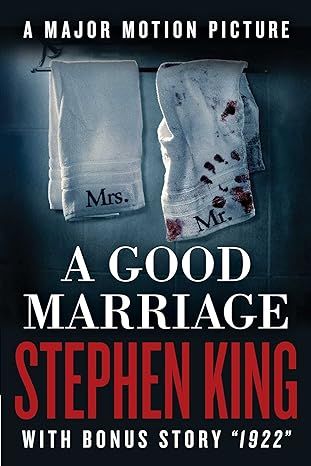
A Good Marriage
4.1
-
5,995
$4.99
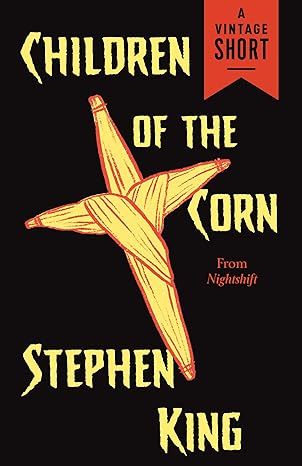
Children of the Corn (Kindle Single) (A Vintage Short)
4.3
-
1,084
$0.99
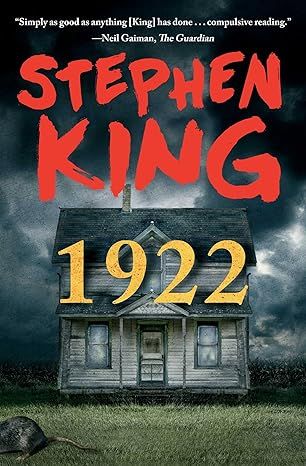
1922
4.6
-
6,082
$7.99

UR
4.3
-
6,140
$3.99
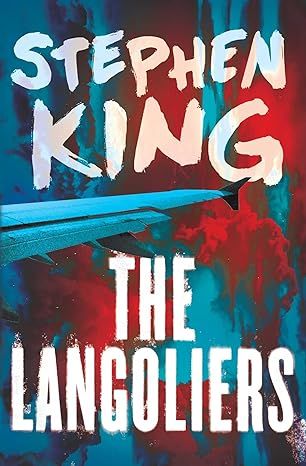
The Langoliers
4.6
-
1,014
$6.49
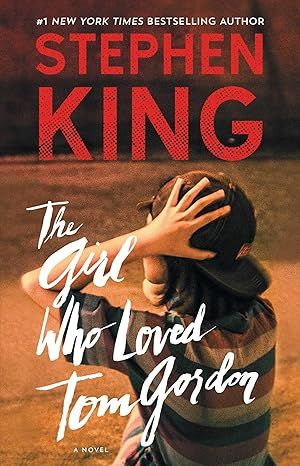
The Girl Who Loved Tom Gordon: A Novel
4.5
-
4,774
$1.17
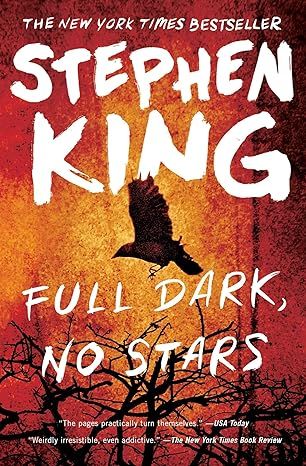
Full Dark, No Stars
4.6
-
6,762
$5.00

Gwendy's Button Box: A Novella (Gwendy's Button Box Trilogy Book 1)
4.5
-
21,335
$3.88
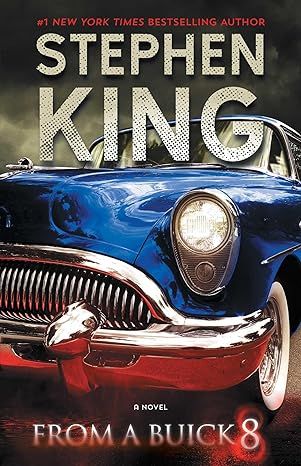
From a Buick 8: A Novel
4.3
-
2,174
$11.99
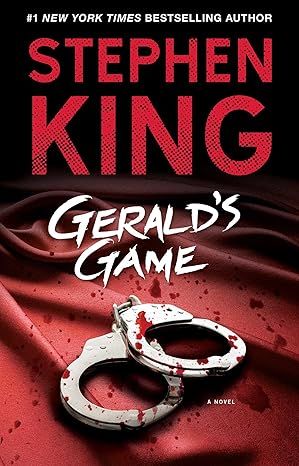
Gerald's Game
4.2
-
3,838
$1.97
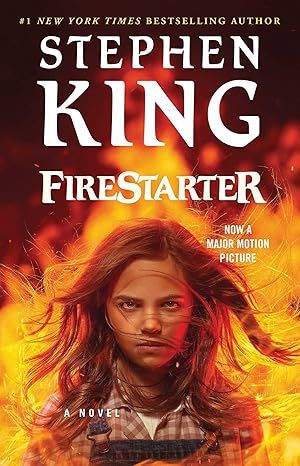
Firestarter
4.6
-
5,489
$9.99
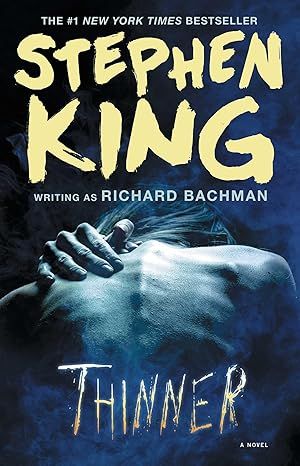
Thinner
4.5
-
3,107
$2.50
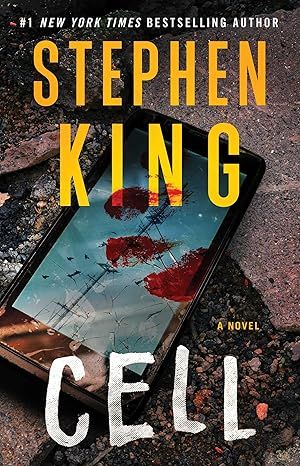
Cell: A Novel
4.3
-
5,196
$3.31
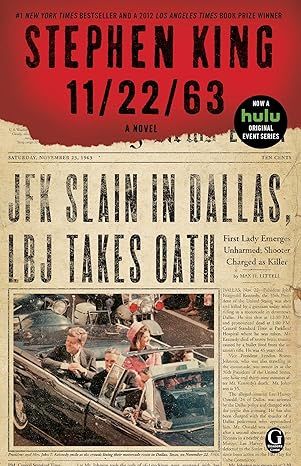
11/22/63: A Novel
4.6
-
11,307
$11.99
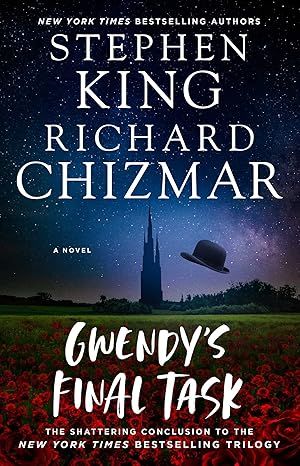
Gwendy's Final Task (3) (Gwendy's Button Box Trilogy)
4.6
-
8,788
$7.87
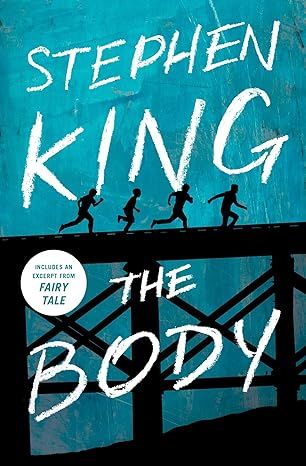
The Body
4.7
-
4,496
$10.48
Best Sellers

The Tuscan Child
4.2
-
100,022
$8.39

The Thursday Murder Club: A Novel (A Thursday Murder Club Mystery)
4.3
-
155,575
$6.33

Sapiens: A Brief History of Humankind
4.6
-
140,302
$13.49

The Butterfly Garden (The Collector, 1)
4.3
-
88,556
$9.59

Things We Hide from the Light (Knockemout Series, 2)
4.4
-
94,890
$11.66

The Last Thing He Told Me: A Novel
4.3
-
154,085
$2.99

The Perfect Marriage: A Completely Gripping Psychological Suspense
4.3
-
143,196
$9.47

The Coworker
4.1
-
80,003
$13.48

First Lie Wins: A Novel (Random House Large Print)
4.3
-
54,062
$14.99

Mile High (Windy City Series Book 1)
4.4
-
59,745
$16.19

Layla
4.2
-
107,613
$8.99

The Locked Door
4.4
-
94,673
$8.53
